Want faster software releases? CI/CD tools are the answer. These tools automate code building, testing, and deployment, helping UK businesses release updates efficiently while reducing errors. Here's what you need to know:
- Why it matters: Faster releases let you respond quickly to customer needs. Teams using CI/CD deploy 46x more often and see 7x fewer failures (DORA 2024).
- Key tools:
- Jenkins: Custom workflows with plugins; requires maintenance.
- GitLab CI/CD: All-in-one DevOps with built-in security.
- CircleCI: Speed-focused with parallel execution.
- AWS CodePipeline: Best for AWS users; cost-effective.
- Azure Pipelines: Multi-platform support; integrates with Microsoft tools.
- Choosing the right tool: Consider automation, integration, cost, and scalability.
Quick Comparison:
| Tool | Deployment Options | Key Strengths | Pricing (GBP) | Best For |
|---|---|---|---|---|
| Jenkins | Self-hosted | Highly customisable plugins | Free (hosting costs) | Complex workflows |
| GitLab CI/CD | Cloud & self-hosted | Integrated DevOps, security | From £15.50/user | Security-focused teams |
| CircleCI | Cloud & self-hosted | Speed, parallel builds | From £12.25/month | Fast, containerised apps |
| AWS CodePipeline | AWS cloud only | Native AWS integration | £0.80/pipeline | AWS-focused teams |
| Azure Pipelines | Cloud & on-prem | Multi-platform, YAML workflows | From £32.50/month | Microsoft ecosystem users |
To maximise CI/CD benefits, adopt practices like Infrastructure as Code, automated testing, and security checks. Tools like Terraform, SonarQube, and Prometheus can help ensure reliable, secure deployments. For tailored advice, Hokstad Consulting supports UK businesses in optimising CI/CD pipelines for speed and compliance.
Top CI/CD Tools for Automating Software Development: A Comprehensive Comparison
How to Choose CI/CD Tools
Picking the right CI/CD tool is crucial for streamlining development workflows. With over 70% of software teams in the UK now using some form of CI/CD automation [4], making the right choice has never been more important. The wrong tool can waste developer time, increase cloud costs, and cause deployment delays. Since automated CI/CD brings so many advantages, selecting the right tool is a decision that deserves careful consideration.
Automation and Pipeline Options
When evaluating CI/CD tools, focus on their automation capabilities. Tools that support custom pipelines, parallel execution, and automated test triggers are particularly valuable [4].
For example, Jenkins offers unparalleled flexibility thanks to its extensive plugin ecosystem, making it ideal for complex workflows - though it does require more maintenance. GitLab CI/CD, on the other hand, provides strong pipeline automation with built-in security scanning, while CircleCI stands out for its fast builds, thanks to parallel execution and caching.
Look for tools that offer YAML-based or visual pipeline configuration. These features simplify management and make it easier for your team to get up to speed, even as workflows grow more advanced. Multi-stage, parallel, and conditional pipelines are must-haves for handling diverse project needs.
Modern CI/CD tools also integrate seamlessly with Infrastructure as Code (IaC) platforms like Terraform and Pulumi. This integration can lead to deployment speeds up to 75% faster and reduce errors by 90% [1]. Ensuring that your chosen tool supports IaC is critical for efficient and reliable development.
Integration with Existing Tools
Good integration can save your team hours of setup and troubleshooting. Your CI/CD tool should work smoothly with your version control system, cloud platforms, and other third-party services [3].
Native integrations are often more reliable than plugin-based solutions. For instance, GitLab CI/CD and GitHub Actions offer seamless integration with their respective version control platforms, making setup straightforward and reducing reliance on third-party add-ons. Similarly, Azure Pipelines integrates deeply with both Azure DevOps and GitHub, making it a strong choice for teams using Microsoft tools.
When it comes to cloud integration, ensure the tool supports your preferred provider. AWS CodePipeline, for example, works natively with AWS services, while tools like CircleCI and GitLab CI/CD perform well across multiple cloud environments. Additionally, look for integrations with monitoring, security, and notification tools to maintain a smooth workflow. Strong integration capabilities not only simplify operations but also help reduce costs and support scalability.
Cost and Scalability for UK Teams
The total cost of ownership for a CI/CD tool goes beyond just the initial price. You’ll also need to consider infrastructure and maintenance costs, as well as the time developers spend managing the tool instead of working on features.
| Tool | Free Tier | Paid Plans (GBP) | Best For |
|---|---|---|---|
| Jenkins | Free (hosting costs apply) | Free (hosting costs apply) | Custom workflows, cost-conscious teams |
| GitLab CI/CD | Free tier available | From £15.50/user/month | Integrated DevOps, security-focused teams |
| CircleCI | 6,000 build minutes/month | From £12.25/month | Fast builds, parallel execution |
| GitHub Actions | Free for public repos | £0.0065/minute for private | GitHub-centric teams |
| Azure Pipelines | 1,800 minutes/month free | From £32.50/month | Microsoft stack users |
Cloud-based solutions often offer better value for growing teams, thanks to their flexible, usage-based pricing. However, self-hosted options like Jenkins may be a better fit for organisations with specific security needs, despite their higher maintenance demands.
Think about your team’s growth trajectory. Many leading tools, such as CircleCI and GitLab CI/CD, offer both cloud-hosted and self-hosted options, giving you the flexibility to start small and scale up as needed. For UK businesses, it’s also essential to confirm that your chosen vendor provides billing and support in GBP and complies with UK/EU data protection standards. This ensures regulatory compliance while protecting your budget from currency fluctuations.
Finally, modern CI/CD tools are increasingly incorporating built-in security and compliance features. This trend is especially relevant for UK organisations operating under frameworks like GDPR or FCA regulations. Automated compliance checks can help you maintain deployment speed while avoiding costly penalties.
For UK-based teams looking to make informed decisions, Hokstad Consulting offers guidance on DevOps transformation and cloud cost optimisation, ensuring your CI/CD tool aligns with both your technical needs and financial goals.
Top CI/CD Tools for Faster Releases
The world of CI/CD boasts a variety of tools, each tailored to simplify automation and integration in unique ways. Here’s a look at five popular platforms widely embraced by development teams across the UK, each offering distinct advantages for streamlining pipelines.
Let’s break down what makes these tools stand out and how they can align with your team’s goals.
Jenkins
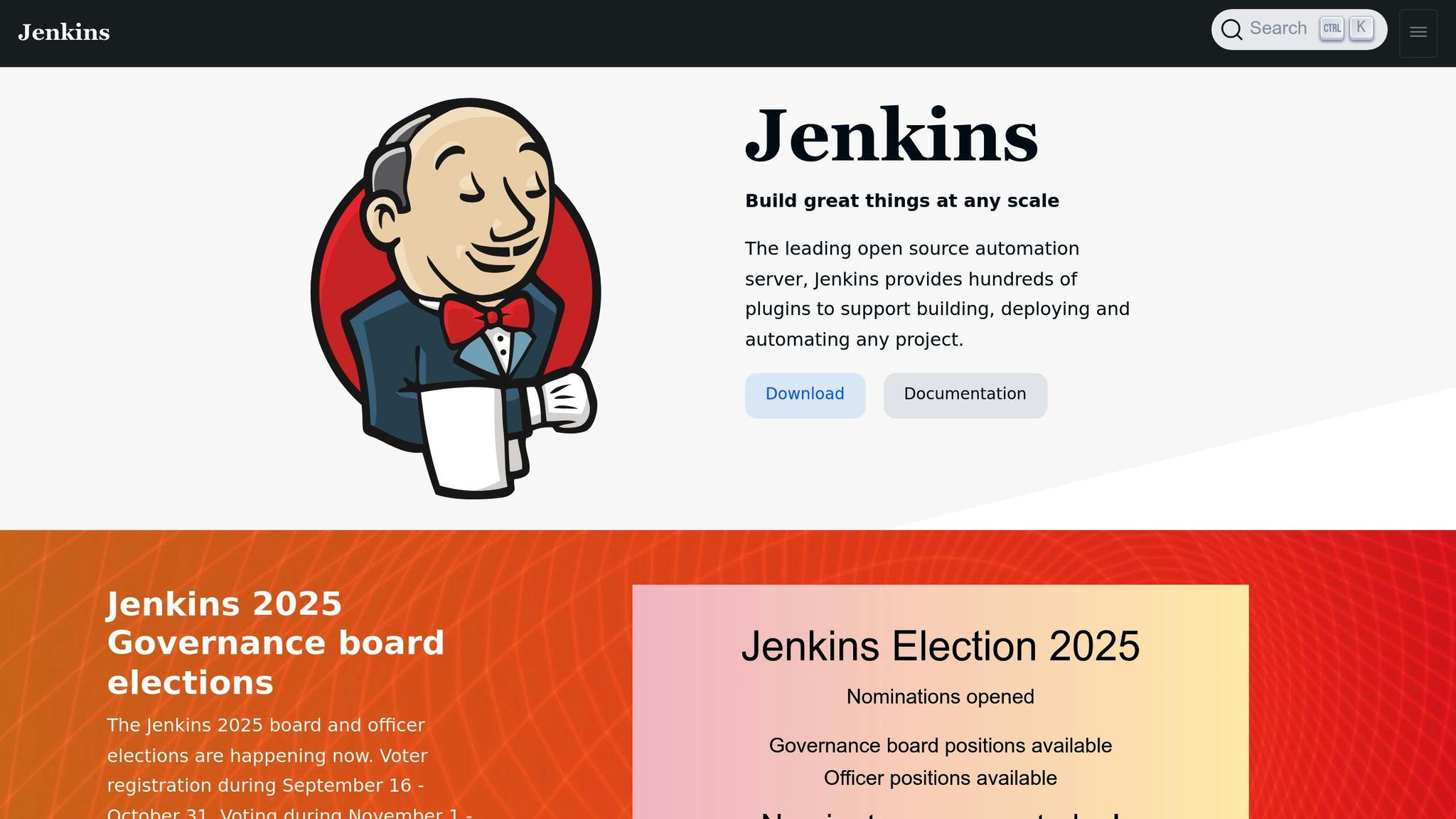
Jenkins is a veteran in the CI/CD space, trusted by over 300,000 organisations globally [4]. Its standout feature is its vast plugin ecosystem, which offers almost endless opportunities for customisation. This makes it ideal for managing intricate workflows using its Pipeline-as-Code approach. Jenkins seamlessly integrates with version control systems like Git, Subversion, Mercurial, and Perforce [8]. However, it does come with a catch - it requires dedicated infrastructure and ongoing maintenance. Jenkins is best suited for organisations with complex requirements and a dedicated DevOps team to handle the operational overhead.
Looking for a more streamlined solution? That’s where GitLab CI/CD shines.
GitLab CI/CD
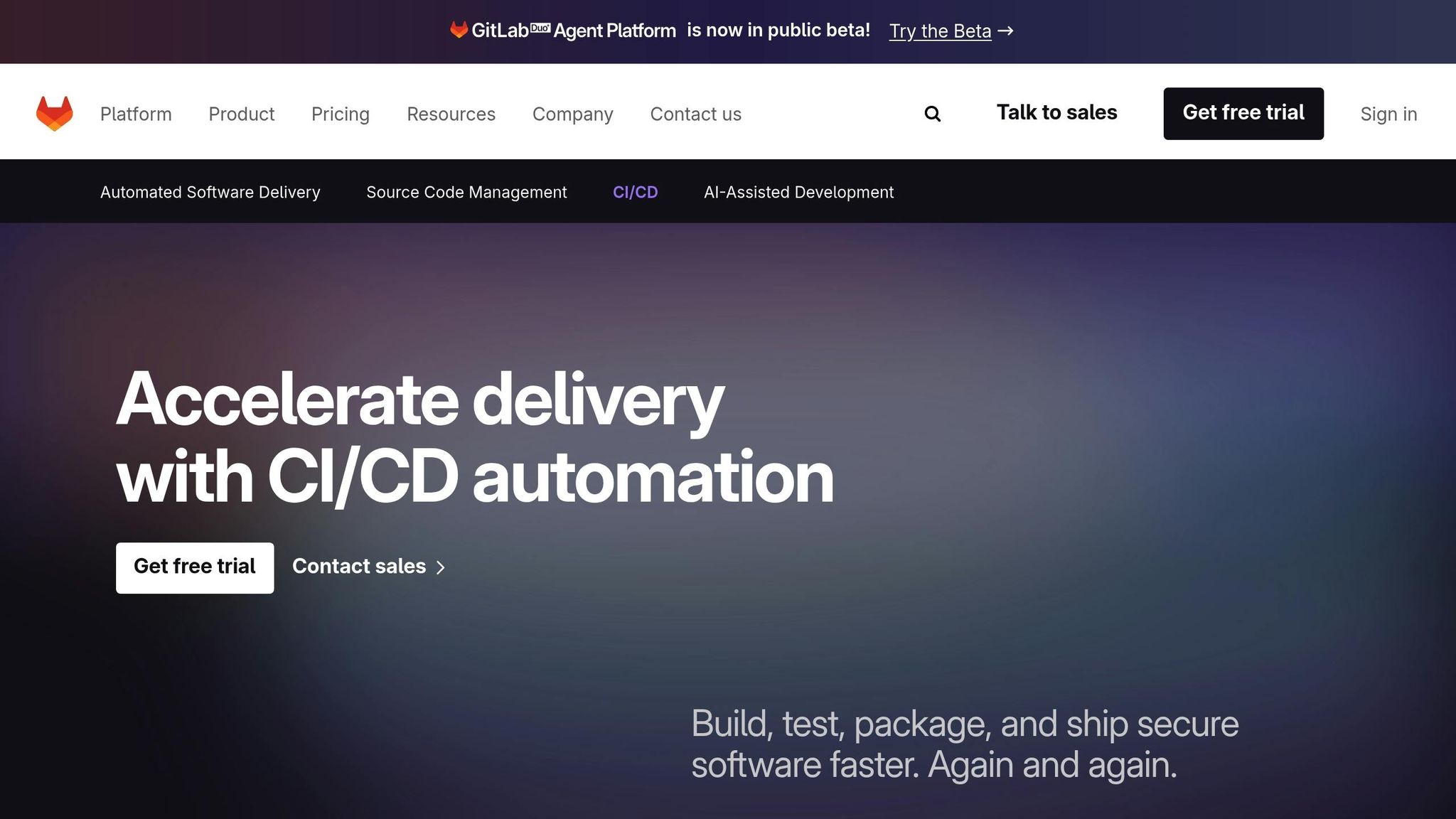
GitLab CI/CD is an all-in-one DevOps platform, combining version control with built-in CI/CD tools. It promises up to 50% faster deployments thanks to its integrated automation and security features [4]. Its Auto DevOps capability simplifies pipeline setup, automatically configuring workflows for common scenarios to save time. With YAML-based pipeline definitions, even developers with limited DevOps experience can get started quickly. It also includes security scanning and compliance tools, making it a strong choice for regulated industries in the UK. Whether you prefer a cloud-hosted setup or a self-managed option with GDPR-compliant UK/EU data centres [8], GitLab CI/CD is perfect for teams seeking a unified platform with a focus on security and efficiency.
Next, let’s look at CircleCI, which takes speed and performance to the next level.
CircleCI
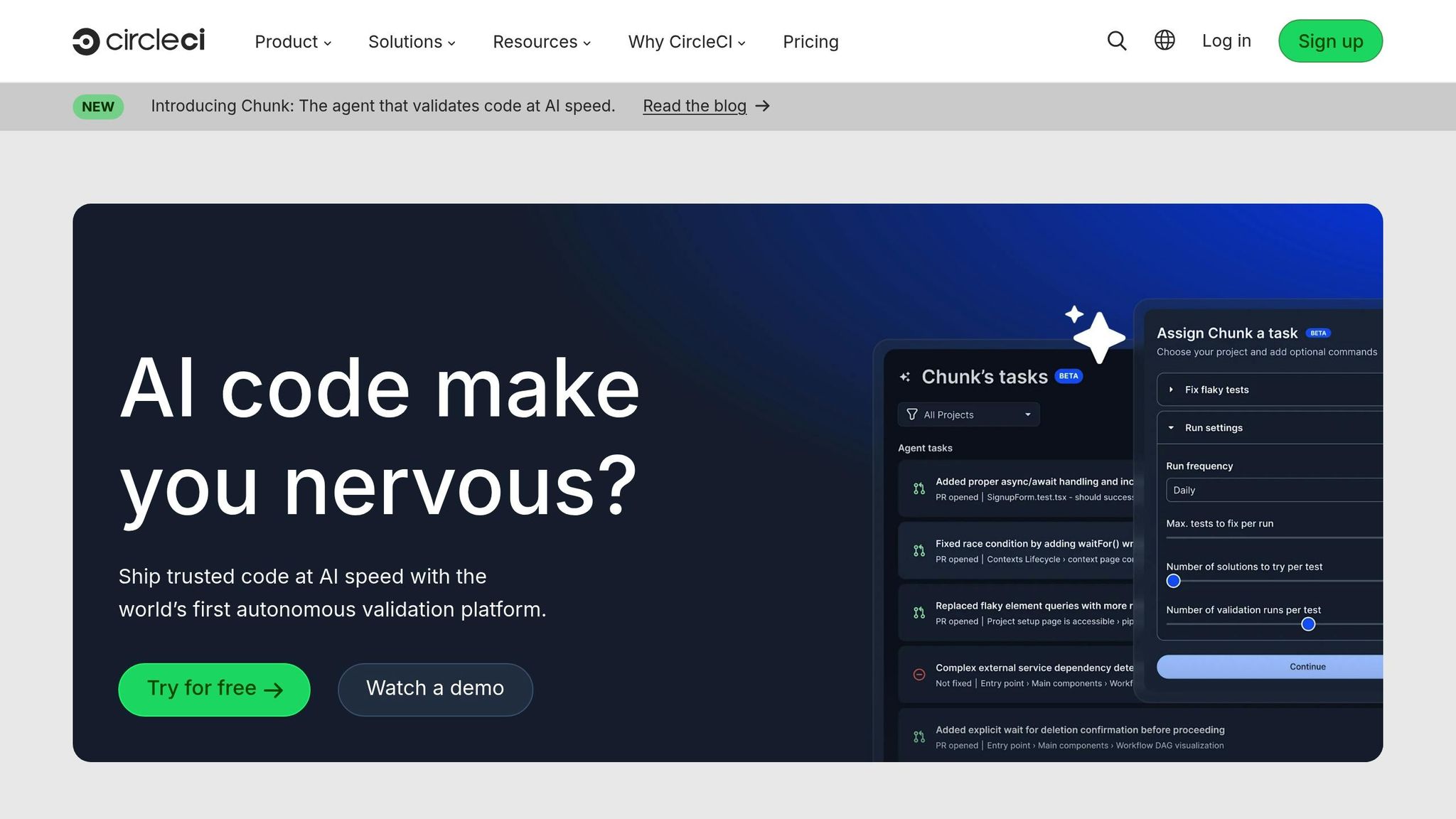
CircleCI is all about speed and performance. Its features, like parallelism and caching, can cut build times by up to 70% [4]. The platform offers both cloud-hosted and on-premises options, catering to diverse team needs. Its Orbs - pre-packaged, reusable modules - make it easier to handle repetitive CI tasks [5]. CircleCI integrates with GitHub, Bitbucket, and GitLab [8], ensuring flexibility while optimising resource use. This tool is ideal for teams focusing on fast builds and containerised applications, with built-in performance insights to help fine-tune workflows.
For teams already working within AWS, CodePipeline offers seamless integration.
AWS CodePipeline
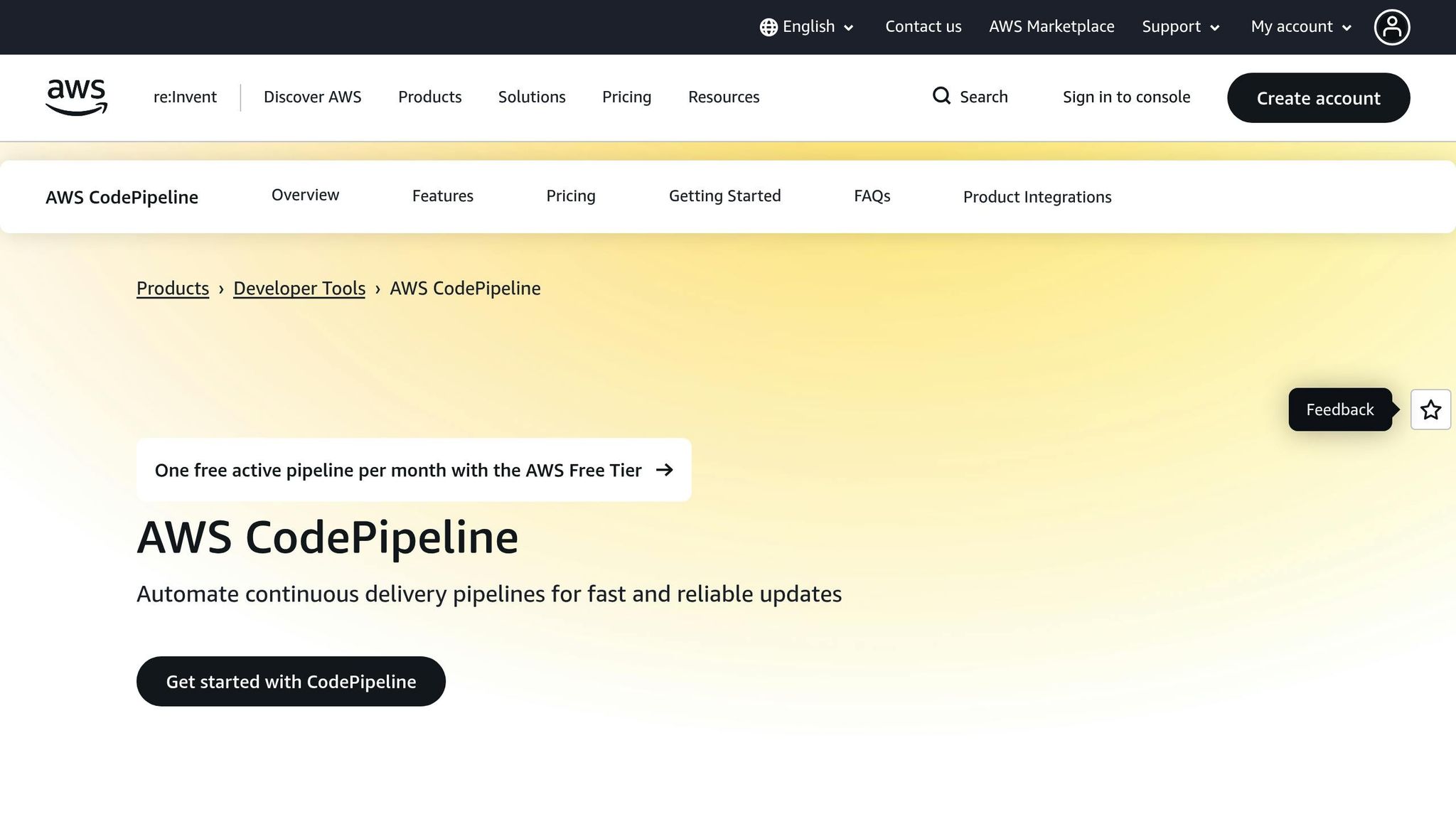
AWS CodePipeline is designed for teams building within the AWS ecosystem. It automates the entire release process, linking build, test, and deployment stages across AWS services. At around £0.80 per active pipeline per month, plus related AWS service costs [2][7], it’s a cost-effective option for UK-based cloud-native teams. Its native integration with AWS tools like CodeCommit, Lambda, ECS, and S3 simplifies deployment automation [2]. CodePipeline also supports parallel actions, adding flexibility to pipeline stages. It’s a natural fit for teams already invested in AWS or those focusing on cloud-native development.
Finally, Azure Pipelines offers robust multi-platform capabilities.
Azure Pipelines
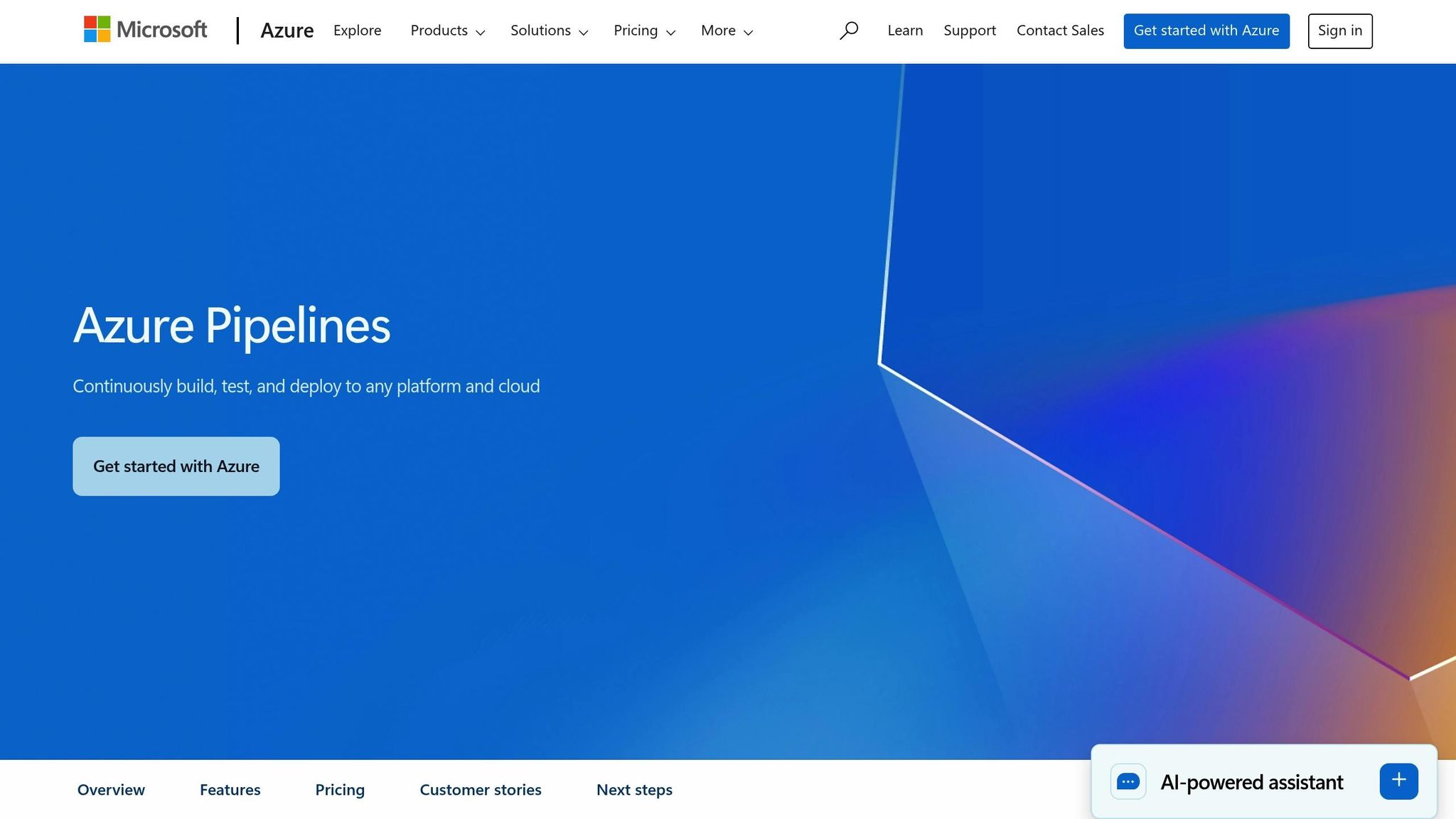
Azure Pipelines is a flexible tool that supports multi-platform deployments and integrates seamlessly with Microsoft’s ecosystem, including Azure Repos, Boards, and Artifacts. It also works with GitHub, Bitbucket, and Subversion [8]. Trusted by over 80,000 organisations worldwide [5], it’s particularly appealing to open-source projects, offering up to 10 parallel jobs for free for public repositories [5]. With YAML-based workflows and matrix builds, it ensures optimised performance across various configurations. Azure Pipelines also supports hybrid and multi-cloud strategies, enabling deployments to Azure, on-premises setups, and other cloud platforms [8][9]. This makes it a great option for enterprises relying on Microsoft technologies or managing diverse infrastructure needs.
Each of these tools caters to specific requirements - whether it’s Jenkins’ customisation, GitLab’s all-in-one approach, or CircleCI’s focus on speed. The right choice for your team depends on your technical priorities, existing infrastructure, and how you prefer to operate.
Need help optimizing your cloud costs?
Get expert advice on how to reduce your cloud expenses without sacrificing performance.
CI/CD Tools Comparison
Picking the right CI/CD tool for your UK business means weighing up features, costs, and how well the tool can grow with your needs. Here's a breakdown of how five popular platforms compare across key factors that matter to development teams:
| Tool | Deployment Options | Key Strengths | Pricing (GBP) | Best For |
|---|---|---|---|---|
| Jenkins | Self-hosted only | Over 1,800 plugins; highly customisable | Free (infrastructure costs apply) | Complex workflows, large enterprises |
| GitLab CI/CD | Cloud & self-hosted | Integrated DevOps; built-in security | Free tier, £16+/user/month | Teams seeking an all-in-one solution |
| CircleCI | Cloud & self-hosted | Speed, parallelism, Docker support | Free tier, £12–£15+/month | Fast builds; containerised apps |
| AWS CodePipeline | AWS cloud only | Native AWS integration; managed service | £0.80+/pipeline/month | AWS-focused teams |
| Azure Pipelines | Cloud & on-premises | Multi-platform support; YAML workflows | Free tier, £33.60+/job/month | Microsoft ecosystem users |
Each of these platforms brings something different to the table. Jenkins stands out for its vast plugin ecosystem, offering over 1,800 options for extensive customisation. However, this flexibility can make setup and maintenance more complex. GitLab CI/CD simplifies things by combining source control, automated testing, and security scanning into a single platform [3][6]. CircleCI, on the other hand, is all about speed, with features like parallel execution and caching to slash build times [3][5].
Integration capabilities vary across the tools. Jenkins supports GitHub, Bitbucket, Jira, and many monitoring tools through its plugins [4]. CircleCI connects with GitHub, Bitbucket, and Docker, and also offers Orbs
for reusable integrations [5]. AWS CodePipeline naturally integrates with AWS services but also supports GitHub and third-party tools via custom actions [2]. Azure Pipelines works seamlessly with Azure Repos, GitHub, Bitbucket, and testing tools like Selenium [5].
Scalability is another critical factor. Jenkins can scale using distributed build agents, but this requires manual management [4]. GitLab CI/CD and CircleCI both support concurrent pipelines and horizontal scaling. AWS CodePipeline leverages AWS's cloud infrastructure for virtually unlimited scaling, while Azure Pipelines supports multiple agents and cloud-based scaling for enterprise workloads [2][5].
For security and compliance, GitLab CI/CD includes features like vulnerability management and code quality checks, with options to ensure GDPR compliance through self-hosting and data residency [3][6]. CircleCI offers secure environments and compliance options, including UK/EU data residency for enterprise users [5]. AWS CodePipeline and Azure Pipelines also provide strong security measures, encryption, and compliance certifications, with data centres in the UK and EU [2][5].
When it comes to cost, the picture varies. Jenkins is free to use but requires investment in hosting and maintenance. GitLab's premium plans start at around £16 per user per month, while CircleCI's paid plans range from £12 to £15 per month [3][5]. AWS CodePipeline charges approximately £0.80 per active pipeline each month, though additional AWS service costs apply [7]. Azure Pipelines offers free minutes for public projects, with private project pricing starting at about £33.60 per parallel job monthly [5].
For UK businesses with strict data residency requirements, self-hosted tools like Jenkins or GitLab CI/CD provide full control over data location and compliance [4][6]. Meanwhile, teams focused on speed and simplicity often prefer cloud-native options like CircleCI, AWS CodePipeline, or Azure Pipelines [2][5].
Ultimately, the best tool depends on your team's priorities, existing infrastructure, and operational needs. If you're looking for tailored advice on CI/CD tools, consider consulting Hokstad Consulting (https://hokstadconsulting.com).
CI/CD Release Automation Best Practices
Streamline your CI/CD tools with strategies designed to minimise errors, speed up deployments, and secure releases. These methods have enabled organisations across the UK to significantly reduce deployment times while maintaining rigorous quality and compliance standards.
Using Infrastructure as Code
Managing infrastructure as code (IaC) replaces manual configurations with automated, repeatable processes. This approach treats servers, networks, and cloud resources like software - version-controlled, tested, and automated.
Tools like Terraform, AWS CloudFormation, and Ansible allow you to define your infrastructure in configuration files. This ensures consistent environment builds, whether for development, testing, or production. By eliminating manual changes, you avoid configuration drift, where environments diverge over time.
IaC has been shown to reduce configuration drift by 40% and improve deployment reliability by 25% [2]. It also drastically shortens environment setup times, taking minutes instead of hours.
Take Monzo Bank as an example. In June 2024, they integrated automated security scanning into their CI/CD pipeline using GitLab CI/CD and SonarQube, achieving a 45% reduction in critical vulnerabilities post-release and a 30% faster compliance audit process. This initiative, led by their DevOps Lead, James Taylor, fully utilised IaC and automated testing [4].
Scaling infrastructure becomes effortless with IaC. Whether you're managing traffic surges during peak shopping seasons or expanding into new markets, predefined templates allow your infrastructure to grow automatically. This removes delays caused by manual provisioning and sets the stage for more advanced automation in testing and monitoring.
Automated Testing and Monitoring
Building quality gates into your CI/CD pipeline ensures potential issues are caught early. Automating tests and running them in parallel can significantly reduce build times. Tools such as CircleCI and GitLab CI/CD support parallel test execution, helping teams release faster without compromising quality.
Deployment gates enforce key requirements - like 80% code coverage, zero critical vulnerabilities, and no performance regressions - before code progresses to the next stage.
For example, in February 2025, BBC Digital transitioned their CI/CD workflows to CircleCI, incorporating parallel testing and real-time monitoring. This move cut average deployment times from 45 minutes to just 18 minutes and improved release reliability by 28%. The project was overseen by Sarah Williams, BBC’s Head of Engineering [5].
Post-deployment monitoring is equally vital. Tools like Prometheus, Grafana, and cloud-native monitoring solutions provide real-time insights into application health, alerting teams immediately when issues arise. This proactive approach ensures problems are addressed before they affect users.
Security and Compliance Requirements
In addition to speed and reliability, security and compliance are non-negotiable for UK businesses. DevSecOps practices embed security checks directly into the CI/CD pipeline, automating compliance verification.
Tools like SonarQube, Snyk, and Checkmarx scan code for vulnerabilities, licensing issues, and compliance violations with every commit. Platforms like GitLab CI/CD offer built-in security scanning, while others support integration through plugins or APIs.
Role-based access control ensures that only authorised personnel can deploy to production. Many CI/CD platforms integrate with systems like Active Directory, LDAP, or SAML for centralised user management.
Automated audit trails log every deployment, test, and approval, complete with timestamps and user details. This simplifies compliance audits and supports incident investigations.
Businesses using automated CI/CD pipelines report up to 50% faster release cycles and a 30% reduction in deployment-related incidents [4]. By integrating security measures into the pipeline, organisations can maintain both compliance and the fast-paced release schedules needed to stay competitive.
For UK companies aiming to adopt these practices, Hokstad Consulting offers tailored DevOps transformation services. Their expertise in cloud cost management and custom automation helps businesses design CI/CD pipelines that meet regulatory requirements while controlling operational expenses. Their solutions are crafted to address the specific challenges UK organisations face in balancing speed, security, and compliance.
Conclusion
For UK businesses aiming to deliver software quickly and reliably, CI/CD tools are a game-changer. These platforms streamline build, test, and deployment processes, cutting out manual delays while keeping quality intact.
The key to success lies in choosing the right tools and adopting best practices. Jenkins, with its extensive plugin library, offers unmatched customisation. GitLab CI/CD delivers a unified platform, while cloud-based options like CircleCI and AWS CodePipeline provide scalability without the hassle of managing on-premises infrastructure. Picking the right combination ensures smoother, faster, and more secure software delivery.
But tools alone aren’t enough. A well-rounded strategy - integrating Infrastructure as Code, automated testing, and robust security - ensures consistent, high-quality outputs. This approach not only reduces errors but also allows developers to focus on creating features that drive growth.
For businesses looking to navigate this transformation, Hokstad Consulting offers tailored DevOps solutions. They specialise in addressing challenges like balancing speed, security, and compliance. Their expertise in cloud cost optimisation and automation helps organisations build CI/CD pipelines that speed up releases while keeping operational costs in check. Plus, their fees are tied to the savings they help achieve, making it a win-win for businesses.
FAQs
What should I consider when selecting a CI/CD tool for my business?
When selecting a CI/CD tool, it's crucial to align your choice with your business's unique requirements and objectives. Start by examining how well the tool integrates with your current tech stack, its automation features, and whether it can scale to accommodate future growth. Also, consider its ease of use and whether it suits your team's skill set.
Budget is another significant factor - look at both initial costs and ongoing expenses to ensure you're getting good value. Pay close attention to security features like robust access controls and adherence to industry standards, as these are essential for protecting your workflows. Lastly, choose a tool that offers reliable vendor support or has an active user community, so you can address any issues promptly and keep your processes running smoothly.
How do CI/CD tools work with existing infrastructure, and what benefits do they bring?
CI/CD tools are designed to mesh effortlessly with your existing infrastructure, simplifying both development and deployment workflows. By automating repetitive tasks, they help minimise errors, boost efficiency, and speed up release cycles.
Hokstad Consulting specialises in fine-tuning DevOps and cloud infrastructure, offering customised CI/CD pipeline setups. These tailored solutions enable quicker deployments and more dependable software releases, giving businesses the freedom to concentrate on innovation while keeping downtime and errors to a minimum.
What are the best practices to follow when using CI/CD tools for secure and efficient software releases?
To ensure software releases are both secure and efficient using CI/CD tools, hone in on automation, consistency, and monitoring. By automating pipelines, you can cut down on manual errors and simplify the deployment process. Incorporating Infrastructure as Code (IaC) guarantees uniform environments across development, testing, and production stages.
Strengthen your setup with robust monitoring and logging systems to keep an eye on performance and catch potential problems early. Security should also be a high priority - embed automated testing, run vulnerability scans, and schedule regular updates within your workflows. These steps not only boost reliability but also reduce downtime and speed up release cycles.
